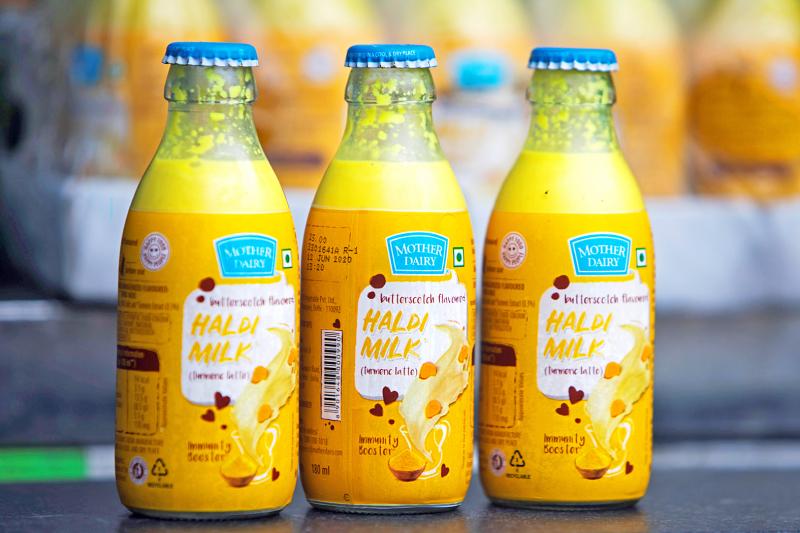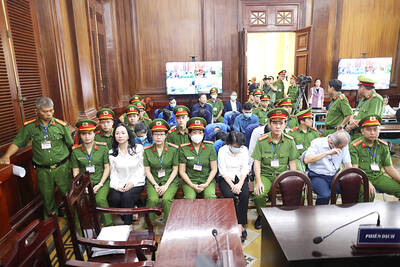New Delhi housewife Sashi scoops COVID-19 “immunity boosting” powder into a jug of water every morning for her family, joining a growing number of Indians who believe that traditional supplements will help ward off the virus.
People in India are increasingly turning to Hindu ayurvedic medicine amid the pandemic and modern Indian consumer companies are cashing in on growing demand for alternative approaches, turning homemade therapies into packaged products such as turmeric milk and holy basil drops.
Sashi, 50, saw adverts on television for a herbal drink made by ayurveda and yoga tycoon Baba Ramdev “that can keep my family safe from the coronavirus.”

Photo: AFP
“I thought that since it’s been on TV, it must be good,” she said.
The pandemic has increased nervousness about the fragile state of India’s healthcare system. Experts say that because of under-testing and under-reporting the number of cases and deaths is much higher that officially reported.
The natural remedies sector was massive even before the pandemic, with claims that they could treat everything from cancer to the common cold.
It is now worth US$10 billion a year, according to the Confederation of Indian Industry.
Ayurveda practitioner Bhaswati Bhattacharya said that the lack of a coronavirus vaccine and other conventional treatments has driven the rush toward familiar natural remedies.
“Ayurveda has been written for 5,000 years and been around probably for twice that at least. It’s lived through plagues, smallpox and pandemics, so people are saying: ‘Let’s see if it works,’” Bhattacharya said.
The rising interest in ayurveda — the “science of life” in Sanskrit — and other therapies has also been encouraged by Indian Prime Minister Narendra Modi’s Bharatiya Janata Party, which in 2014 set up the Ministry of Ayurveda, Yoga & Naturopathy, Unani, Siddha, Sowa Rigpa and Homeopathy.
In January the ministry touted traditional remedies as a means to combat the novel coronavirus.
More recently, Indian Minister of Health Harsh Vardhan released guidelines for treating some asymptomatic and mild cases of COVID-19 with ayurveda and yoga.
At chemists, ayurveda products are displayed as prominently as pharmaceutical drugs.
Mother Dairy, a leading milk producer, said that there has been a “phenomenal” consumer response to its recently launched turmeric milk for children.
“The demand is very, very high so we are ramping up the production and distribution,” Mother Dairy products chief Sanjay Sharma told reporters.
“Health and immunity-led products are a new phenomena. This is an opportunity ... to provide precautionary healthcare for consumers at a very affordable price,” Sharma said.

Republican US lawmakers on Friday criticized US President Joe Biden’s administration after sanctioned Chinese telecoms equipment giant Huawei unveiled a laptop this week powered by an Intel artificial intelligence (AI) chip. The US placed Huawei on a trade restriction list in 2019 for contravening Iran sanctions, part of a broader effort to hobble Beijing’s technological advances. Placement on the list means the company’s suppliers have to seek a special, difficult-to-obtain license before shipping to it. One such license, issued by then-US president Donald Trump’s administration, has allowed Intel to ship central processors to Huawei for use in laptops since 2020. China hardliners

A top Vietnamese property tycoon was on Thursday sentenced to death in one of the biggest corruption cases in history, with an estimated US$27 billion in damages. A panel of three hand-picked jurors and two judges rejected all defense arguments by Truong My Lan, chair of major developer Van Thinh Phat, who was found guilty of swindling cash from Saigon Commercial Bank (SCB) over a decade. “The defendant’s actions ... eroded people’s trust in the leadership of the [Communist] Party and state,” read the verdict at the trial in Ho Chi Minh City. After the five-week trial, 85 others were also sentenced on

Conjoined twins Lori and George Schappell, who pursued separate careers, interests and relationships during lives that defied medical expectations, died this month in Pennsylvania, funeral home officials said. They were 62. The twins, listed by Guinness World Records as the oldest living conjoined twins, died on April 7 at the Hospital of the University of Pennsylvania, obituaries posted by Leibensperger Funeral Homes of Hamburg said. The cause of death was not detailed. “When we were born, the doctors didn’t think we’d make 30, but we proved them wrong,” Lori said in an interview when they turned 50, the Philadelphia Inquirer reported. The

RAMPAGE: A Palestinian man was left dead after dozens of Israeli settlers searching for a missing 14-year-old boy stormed a village in the Israeli-occupied West Bank US President Joe Biden on Friday said he expected Iran to attack Israel “sooner, rather than later” and warned Tehran not to proceed. Asked by reporters about his message to Iran, Biden simply said: “Don’t,” underscoring Washington’s commitment to defend Israel. “We are devoted to the defense of Israel. We will support Israel. We will help defend Israel and Iran will not succeed,” he said. Biden said he would not divulge secure information, but said his expectation was that an attack could come “sooner, rather than later.” Israel braced on Friday for an attack by Iran or its proxies as warnings grew of